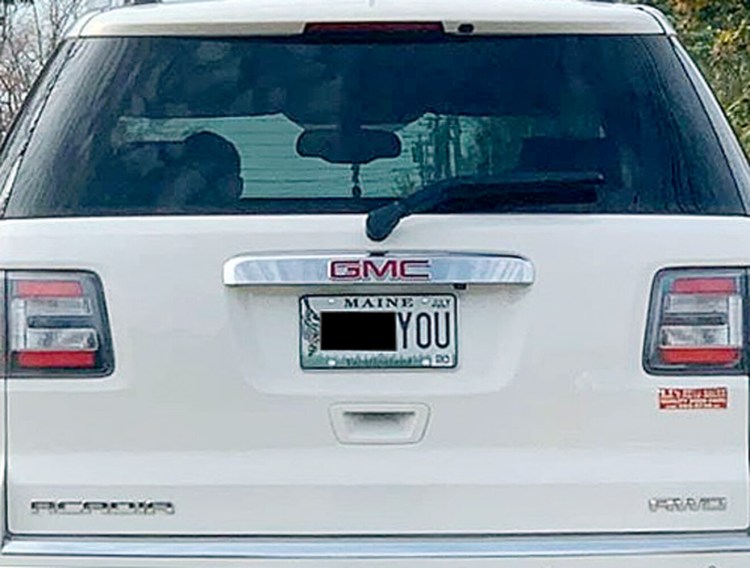Derek Volk did a double-take when he pulled up at a stoplight in Biddeford last weekend.
The license plate on the white SUV in front of him contained a four-letter expletive followed by “you.” He snapped a photo and shared it on Facebook, prompting dozens of comments from people upset by the language.
“If I had a 7-year-old that was learning to read and they were sitting next to me, it would be awkward to explain why it’s on a license plate,” said Volk, who lives in Saco and owns a business in Biddeford.
While some people may be offended to see that type of language on a license plate, it is not against the law in Maine. But that doesn’t mean people aren’t complaining about the edgy words popping up on license plates.
The state stopped screening vanity license plate requests for vulgarities in 2015 and now rejects or recalls plates only if they are likely to incite violence, including those with racial slurs or Nazi slogans, said Secretary of State Matt Dunlap, who doesn’t believe Maine’s previous screening process would have survived a court challenge.
Dunlap said Wednesday that his office receives a “steady drumbeat of complaints” about license plates. He reviews each complaint and his office has rejected some license plates, but he didn’t have the exact number of either complaints or license plates that were not allowed.
Two state senators planned to submit bills to curb vulgar language on license plates, but the Legislative Council voted Wednesday against accepting either bill for the legislative session that begins in January. Both lawmakers say they may try to raise the issue again.
Sen. Ned Claxton, D-Auburn, said he submitted his proposed bill, “An Act to Minimize Potentially Objectionable License Plates,” after hearing from constituents concerned about vulgar language they had seen on license plates.
“I’ve had a couple of constituents complain they are having a hard time explaining to their 8-year-old what the license plate meant,” he said. “They sent me some photos that would make it hard to explain.”
Claxton said he would consider resubmitting a bill in the future after talking to the Secretary of State’s Office and doing more research about what types of license plate language restrictions have been used in other states.
Sen. Stacey Guerin, R-Glenburn, proposed a bill titled “An Act to Prevent Vulgar License Plates,” but knew it was unlikely to be heard for the session in January, which is reserved for emergency legislation, bills held over from the previous session or measures needed to keep the state budget balanced.
Guerin, however, plans to resubmit the bill if she’s reelected.
“I don’t think we should have vulgar or crude things on license plates,” said Guerin, who got involved in the issue after hearing from a constituent who was upset by a vulgar license plate. “It’s an advertisement for Maine, the way life should be. I think we would be better served by having a more family-friendly license plate message. We want to promote that Maine brand of wholesome outdoor life instead of vulgarity.”
Courts in other states have struck down laws restricting the language on license plates on free-speech grounds. New Hampshire’s Supreme Court ruled in 2014 that regulations barring a man from getting a “COPSLIE” plate violated his free-speech rights. Indiana and Maryland have since upheld restrictions on plate language.
When the Maine law was changed in 2015, lawmakers had some misgivings about no longer screening language on license plates, but Dunlap said they were in a tough spot because “we were going to get sued and we were going to lose.”
He said it’s not in the interest of his office to restrict free speech and feels “there aren’t many better places to protect free speech than on state property.” Still, he knows some people are angered by the language they now see on license plates.
“The brunt of it is borne by the registrant. They have the F-word on their plate and are carrying it around,” he said. “I can’t believe people don’t think of the consequences of that. Freedom of speech does not include freedom from consequences.”
Dunlap says he heard anecdotally that some motorists have replaced plates with vulgar words after taking heat in social situations.
“Someone gets a plate that has some rather anti-social message on it and they’re working at their desk when their boss comes in and says ‘Get your car off my property,'” he said. “Or they go to grandma’s house and she says ‘I thought you were smarter than that.'”
Volk, whose wife, Amy, is a former state senator, snapped a photo of the license plate he saw last weekend and posted it on Facebook, where by Wednesday it had garnered nearly 150 comments. He hasn’t had more interactions on a post since his daughter got married.
“It clearly struck a nerve with people,” he said. “People thought I made it up.”
Volk said he understands free speech and that what’s offensive can be subjective, but he doesn’t think the state should issue plates with vulgar words.
“I think most people would agree that license plate is a bit over the top,” he said.
Copy the Story LinkSend questions/comments to the editors.




Success. Please wait for the page to reload. If the page does not reload within 5 seconds, please refresh the page.
Enter your email and password to access comments.
Hi, to comment on stories you must . This profile is in addition to your subscription and website login.
Already have a commenting profile? .
Invalid username/password.
Please check your email to confirm and complete your registration.
Only subscribers are eligible to post comments. Please subscribe or login first for digital access. Here’s why.
Use the form below to reset your password. When you've submitted your account email, we will send an email with a reset code.